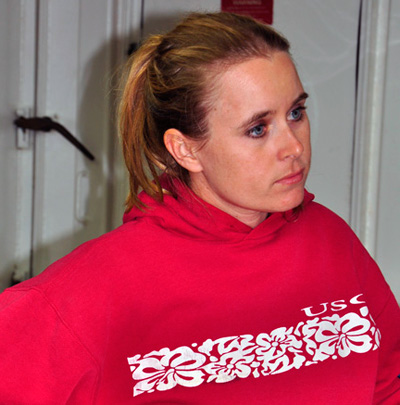Interview with Catie Graver
by Cherie Winner
You do so many different things in this job. Was it hard to train for?
I’ve been at this job for three and a half years, and I feel like I’m still in training for it. I feel like I still don’t know everything there is to know. There’s constantly different things coming up that you have to fix. The big thing is that on a ship, you can’t call the Xerox repairman, and you can’t run to Home Depot or do any of those things that you would take for granted on land. So if the Science group depends on something working, and they need it, you have to find a way to make it happen to the best of your ability.
Did you do any shipboard work before doing this?
I worked on a coastal research vessel prior to coming here. It was with a private, nonprofit company called the Ocean Institute, based out of southern California. I worked on that for six years. I started out teaching oceanography on that ship, and then I morphed into running the programs on the ship. So I was the mate/cook/engineer/deckhand/tech. It was essentially the Captain who drove the boat, and me who did everything else.
That sounds like excellent training for SSSG duty.
Yes! But that job was a lot different because we did one-day trips and, at most, 2- or 3-day trips.
That probably made it easier to have a life on land.
It’s easier to have a life in that you’re not going to miss Christmas and people’s birthdays and the like, but on the other hand it’s a lot more work, because you still have to take care of your home life. You still have to wake up in the morning, cook yourself breakfast, drive to work, prep the boat, get everything ready, then do your thing; and at the end of the day, declutter the boat, do its thing, go home, run to the post office, go grocery shopping…It’s really nice, it’s really convenient out here at sea, to be able to walk up two flights of stairs and have breakfast served to you. It’s quite a luxury. And then go to your office and things are exactly where you left them.
What do you like best about the job?
That’s easy. The ocean and the travel. So many of the places we’ve gone on the ship, you would never go there on your own.
Is there a part of it you don’t like?
Well, by the same token, the travel and being on the ocean all the time! Being away from home is hard, and missing things at home, missing the birth of a family member kind of thing. It’s also, you tell your friends at home that you went to Greece and you went to Iceland and you went to Panama, but what they don’t really understand is, no, I’m not lounging on the beach in Panama. That’s not what we’re doing when we’re there. And also, we’re there for only a couple days at a time, and once you sail away, the ocean looks exactly the same. It doesn’t matter if you’re on the equator or in the Arctic Ocean, the ocean looks exactly the same.
Do you see yourself continuing as an SSSG?
For the near future, yes. I’m sure after a while this lifestyle will start to wear on me a little bit. I don’t see myself as 60 years old still being an SSSG out here! But for the time being, it’s a great job. Like I said, you learn so much out here and you get exposed to so many different things, and the fact that every two or three weeks we get a different group of scientists out here, with a new instrument, studying something totally different, is really cool. It keeps you on your toes.
It sounds mentally very challenging.
It can be. I was just saying this the other night—I said, ‘I strive for boring.’ I really strive to be bored out here, and it doesn’t happen very often. When you’re bored, it means everything’s working and everything’s going well and under control.
Did you ever want to be an oceanographer yourself?
I actually started out to become a Ph.D. and do exactly what these guys are doing. But then I saw the rigors of lab work and being confined to a lab all the time. And also constantly scrambling for grant funding. I was working on a grant-funded project for a while, and then that grant ran out and I was out of a job, and I thought, this stinks! After that, I was unemployed and I went looking for anything, and then I found boats and field oceanography. And it was beautiful.
Were you aware of that kind of option when you were in school?
No, I definitely wasn’t. I only discovered it after I graduated from college. You don’t realize this—for every Ph.D. out there studying something, there’s 10 people that work for them that actually build those instruments and do the tech support for them.
Is there anything you’d like to add, anything you thought I’d ask but didn’t?
What’s your favorite flavor of ice cream?
OK, what is your favorite flavor of ice cream?
Crème brulee by Ben and Jerry’s.
Do you ever get it on the ship?
No. It’s very hard to find. It’s a very limited edition flavor.
|


